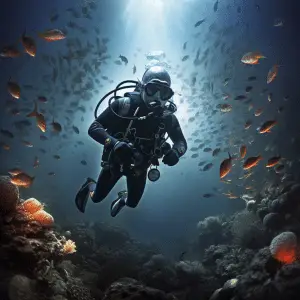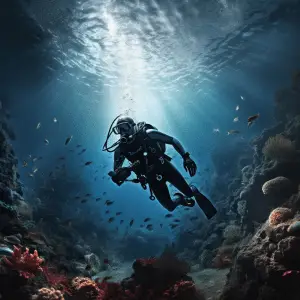Is scuba diving hard? Let’s dive in and find out!
It requires physical fitness and mental preparedness. Learning skills and techniques, such as breathing underwater, equalizing ears, and buoyancy control is essential. Plus, you must be familiar with safety procedures and equipment. Though it may seem intimidating, proper training and practice can help anyone master it.
The ocean can be unpredictable. You must adapt to the conditions and keep yourself safe. But, the rewards are sure to be boundless. Underwater, you’ll feel weightless and experience serenity. Plus, it provides a full-body workout and reduces stress levels.
Since 1966, 25 million people have become certified divers, proving its immense popularity. So, is scuba diving hard? With the right preparation, it can be a thrilling and captivating adventure that you won’t forget!
What is scuba diving?

Scuba diving is an incredible aquatic adventure that enables humans to explore the ocean’s mysterious depths. Special equipment, like SCUBA (Self-Contained Underwater Breathing Apparatus), helps divers to breathe underwater and glide alongside coral reefs, marine life, and shipwrecks.
Divers control their buoyancy with a BCD (Buoyancy Control Device) and experience a weightless sensation as they move through the water. The variety of marine life they encounter can be thrilling and humbling. From tropical fish to dolphins, each dive promises new experiences.
Did you know scuba diving has therapeutic benefits? Research reveals the soothing rhythm of breathing underwater and the mesmerizing beauty of the underwater world helps reduce stress levels, improve mental well-being, and decrease blood pressure levels. Plus, it can also lead to increased mood upliftment.
Nothing compares to the serenity of scuba diving – unless you count the fear of being mistaken for a mermaid snack!
Benefits of scuba diving
Offers a thrilling adventure and numerous benefits. Explore the underwater world, filled with exotic marine life and dazzling coral reefs. It also promotes physical fitness, as it requires swimming against water resistance and strengthens muscles. Further, it can have therapeutic effects on mental health by reducing stress and anxiety. Lastly, it allows for meaningful connections with fellow divers, building a sense of camaraderie.
This activity has even more to offer. For instance, it presents an escape from daily life distractions, immersing individuals in a tranquil oasis beneath the surface. Moreover, it raises environmental awareness through firsthand encounters with fragile ecosystems. Furthermore, it opens up new cultures and destinations worldwide.
Let me tell you a remarkable story. A young woman with anxiety found solace in this activity when all other therapies failed. The peaceful environment underwater allowed her to disconnect from her worries temporarily and regain control over her mind. Through regular dives, she overcame her fear and developed a newfound passion for marine life conservation. Changed her life by providing an outlet for personal growth and healing.
Is scuba diving hard?
Scuba diving: a sport that needs skill, training, and patience. But, with the right guidance and practice, it’s a thrilling experience! Learning to use gear and navigating underwater is no easy task. However, mastering techniques such as pressure equalizing and buoyancy control is key.
Once one’s ready to dive, a whole new world awaits. Exploring reefs, meeting marine life, and feeling weightless – simply incredible. Though, remember that danger is ever-present. So, stay aware, follow safety protocols, and know your physical abilities.
Finally, a bit of history. Humans have been enchanted by underwater breathing for centuries. And, from hollow reeds to modern scuba gear, gear advancements have made diving more accessible. So, why not live life to the fullest and try scuba diving? After all, what’s life without a little adventure and the constant fear of being eaten by a giant fish?
Overcoming challenges in scuba diving
Diving deep underwater is quite an adventure! But scuba diving has its challenges. Here are 4 you may face and how to beat them:
- Pressure: Equalizing pressure can be painful in your ears. Blow gently through your nose while pinching it shut. This helps keep the pressure balanced and stops injury.
- Buoyancy: You must stay neutral. Check and adjust your equipment, like your BCD, to get the right buoyancy. And use your breath to control it.
- Navigation: Finding your way without landmarks can be tricky. Use a compass or natural features like reefs or rocks as reference points. Maps and guide ropes can help too.
- Conditions: Varying weather, currents, and visibility can make diving tricky. Research dive sites beforehand and stay up-to-date with local forecasts. Follow the guidance of experienced locals or instructors.
These challenges can be overcome with practice, patience, and proper training. Keep learning and improving yourself as a diver!
Pro Tip: Swimming outside of scuba diving can help you feel more confident in the water during your dive.
Tips for beginners in scuba diving

Ready to dive into scuba? Here are some tips for beginners.
- Prepare Physically: Exercise regularly to build stamina and lung capacity.
- Learn from Pros: Get a certified scuba course from experienced instructors.
- Equipment: Choose the right gear for your dives.
- Dive Buddy: Always go with a buddy.
- Dive Planning: Check conditions and depth limits before diving.
- Equalization: Learn proper equalization techniques.
So, if you can swim, breathe, and stay calm underwater, go ahead and book a course now – explore the wonders beneath the waves!
Conclusion
Scuba diving is an amazing way to explore the underwater world. But, it requires training and safety protocols to have a great dive.
It can be physically and mentally challenging. Divers must learn buoyancy control, pressure equalizing, and navigation. They also need to handle risks and emergencies.
The benefits of scuba diving are incredible. Spot stunning marine life, vibrant reefs, and even shipwrecks! You can’t find such tranquility anywhere else.
If you’re thinking about scuba diving but haven’t jumped in yet, do it! Don’t miss out on the chance to go beneath the sea’s surface. Push your limits and discover the wonders that await. You won’t regret it!
Frequently Asked Questions
FAQ 1: Is scuba diving hard?
Scuba diving can be challenging for beginners, but with proper training and practice, it becomes easier. It requires learning essential skills and gaining experience to ensure safety and enjoyment.
FAQ 2: Do I need any special qualifications to scuba dive?
Yes, you need to obtain certification from a recognized scuba diving agency. This involves completing a training course that covers theoretical knowledge, confined water dives, and open water dives.
FAQ 3: Can anyone scuba dive?
While scuba diving is accessible to most people, there are certain medical conditions that may prevent individuals from participating. It is important to consult with a medical professional and fill out a medical questionnaire before diving to ensure your safety.
FAQ 4: How long does it take to become a certified scuba diver?
The duration of scuba diving certification courses varies depending on the type of course and the individual’s learning pace. On average, it takes around 3-4 days to complete an entry-level certification course.
FAQ 5: Are there age restrictions for scuba diving?
Most scuba diving agencies have a minimum age requirement of 10-12 years for entry-level courses. However, there is no upper age limit as long as you are in good health and pass the medical evaluation.
FAQ 6: How safe is scuba diving?
Scuba diving, when conducted with proper training, adherence to safety protocols, and using well-maintained equipment, is considered a safe activity. However, it is crucial to always dive within your limits, follow guidelines, and be aware of potential risks.
